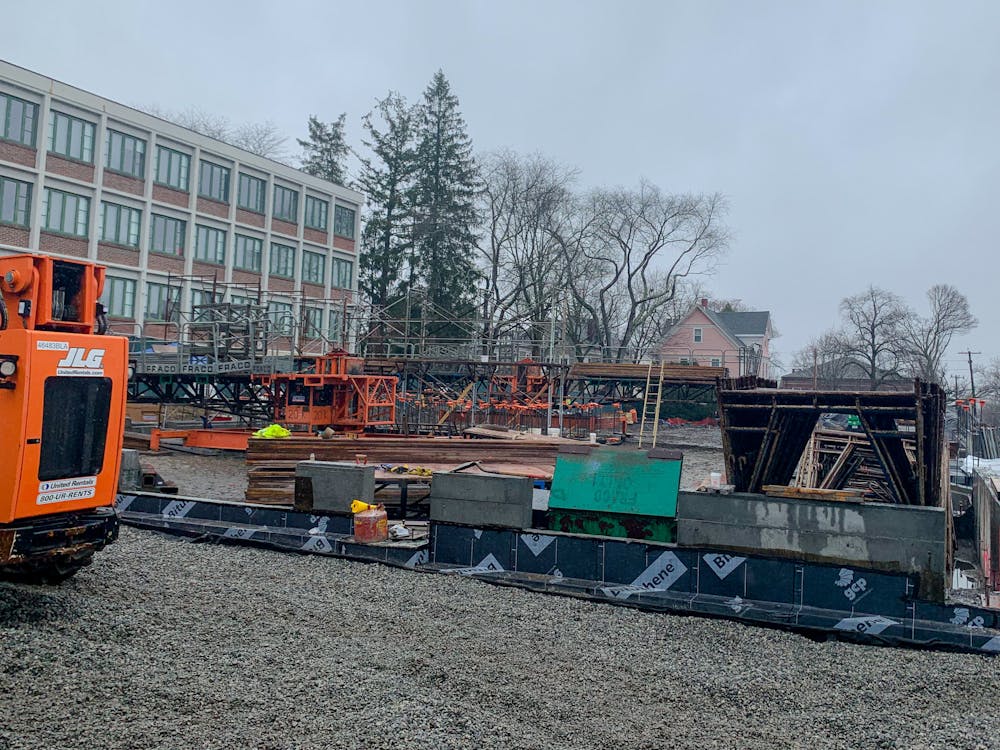The new residence hall on Brook Street is currently on schedule to be complete and ready for occupancy by August 2023.
“The project in general is very healthy,” said Assistant Vice President of Planning, Design & Construction Paul Dietel. The project faced some supply chain issues after the record-breaking freeze in Texas in February 2021, The Herald previously reported, but there are no continuing impacts as of now, Dietel said.
Delays were anticipated in the initial planning of the project, so early funding, mechanical, electrical and trade partners were bought months in advance of when they normally would be. The construction timeline has remained the same: “It’s a very aggressive schedule,” Dietel added, “but we feel we have it staffed appropriately.”
The new building has a “very modern design,” with pod-style suites, kitchens on every floor and a lot of natural daylight, Dietel said. Much like in Wellness Residence Hall, the HVAC system — which usually runs on fossil fuels — is all electric in the Brook Street dormitory. According to Dietel, the University “is in the midst of a decarbonization program,” and one of the goals for this project was to design it in terms of LEED silver standards.
The dorm will consist of two buildings on opposite sides of the street that together will house 353 students, over double the 162 that Wellness currently houses. The original plan for a 375-bed dorm would have crossed through the Providence Historic District, but the revised plan still faced strong opposition from residents and community stakeholders, The Herald previously reported. Criticisms included the plan’s demolition of Bagel Gourmet and East Side Mini-Mart.
While the construction team faced challenges with retail neighbors for the Wellness project, the Brook Street project is directly adjacent to two occupied dorms: Vartan Gregorian Quadrangle and Barbour Hall. According to Dietel, Facilities Management has had “a couple of isolated complaints” but “have not had major issues.”
“I think we’ve done a good job staying out in front of communications with the students,” he said, including a webinar in the fall to explain the process and logistics plans, along with links to the Facilities website that has weekly construction updates.
Construction is currently in the concrete foundation installation phase, which Dietel called “the noisy phase” because of the heavy equipment used. “There’s just no way around that: we need the equipment we need to get out of the ground,” he said. One of the biggest complaints has surrounded backup alarms on equipment, which are required for safety. The team is using a new industry-permitted backup alarm called “the growler,” which is much less intrusive, Dietel said.
Construction has a strict 7 a.m. start and takes place on weekdays only. For the first 30 minutes, an agreement has been set with the contractor to “ease into the day with quieter activities” such as toolbox talks, planning and layout of the day’s work. Noisy work generally starts between 7:30 and 8 a.m, Dietel said. If work needs to be done on weekends in the future, it will not start before 8 a.m.
Ahad Bashir ’24, who lives in Barbour Hall, said that while “the construction seems to be making a lot of progress now … there has been an incredible amount of noise.”
“I've had friends tell me they've basically been conditioned to wake up in anticipation of construction,” he added.
“The construction has been very disruptive to mine and my suitemate’s daily lives,” Sarosh Nadeem ’24, whose Barbour suite directly faces the site, wrote in a message to The Herald.
Nadeem and her suitemate tried to request pushing back the start time by an hour or two, as most of the work currently wraps up around 2 p.m., but have found difficulty getting that request accepted. They were given noise-canceling headphones by the University, which were “a relief to receive,” she wrote, “but there is only so much that headphones can do with very loud drilling outside.”
Nadeem is also concerned for next month as Ramadan approaches, as she will be fasting from sunrise to sunset, heavily relying on being able to sleep in to make it through the day. “With the construction happening outside every day (during the week), I don’t know if it will be that easy,” she wrote.
Although the new dorm is supposed to include “green public spaces,” there used to be multiple large, old trees taller than Barbour at the construction site that were all cut down, Nadeem explained. Another challenge has been the condition of windows in Barbour, some of which flap open and close in the wind and have amplified the construction noise, she added.
Both students have mixed feelings about the new dorm. “I feel that simply creating new dorms doesn't address the issue of people wanting to live in apartments instead of dorms,” Bashir said.
As of now, no decision has been made regarding the student population that will reside in the dorm nor how these spaces will be filled, wrote Senior Associate Dean & Senior Director of Residential Life Brenda Ice. The Office of Residential Life “is an active partner and contributor in new construction as well as renovation projects,” according to Ice.
“I, along with members of my team, attend a variety of planning meetings discussing project timelines and how the physical structure compliments our vision for our residential students — creating a welcoming, supportive and inclusive community,” she added.
The construction of Wellness and the Brook Street dorm is the result of a 2018 housing master plan study conducted by an outside architectural firm. One of the goals identified in this study was to add rooms for 400-500 students on campus; Wellness and the new dorm combined add 515 beds.
In its decarbonization plan, the University outlined its goals to make all renovations and new construction “net-zero or net-zero ready.” The University has a central heating plant near the Olney-Margolies Athletic Center which provides a loop of hot water around campus. “Many, if not all, of the existing residence halls are already on the central heating loop,” and after the conversion, will be fed by an all-electric heating source.
Renewal work is always done in the summer, notwithstanding some pandemic-related budget deferrals, Dietal said. There are no finalized projects in the works because the fiscal years of 2020-22 just wrapped up, he added. Dietel and his team are in the process of planning for fiscal years between 2023-25, but the budget and projects included have not yet been finalized and will be reviewed in May.
“It’s very safe to say that over the next three years we will be performing renovations to existing dormitories,” Dietel said, “working with (ResLife) to determine where those priorities are.”

Rhea Rasquinha is a Metro editor covering development and infrastructure. She also serves as the co-chief of illustrations. She previously covered College Hill, Fox Point and the Jewelry District. Rhea is a senior from New York studying Biomedical Engineering.





